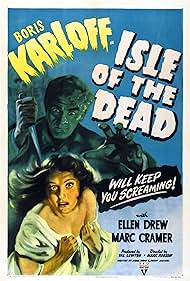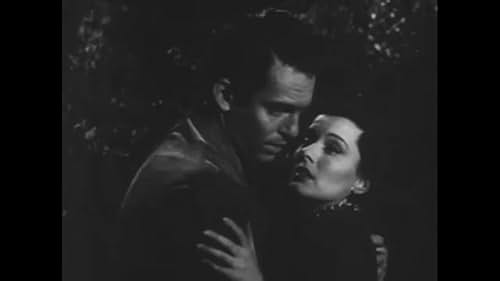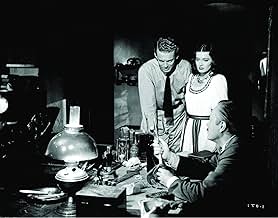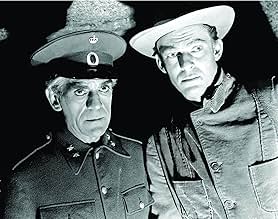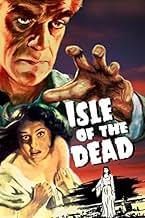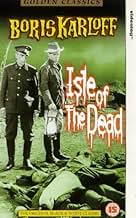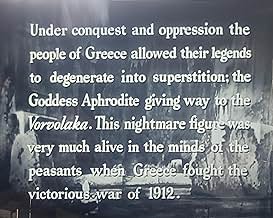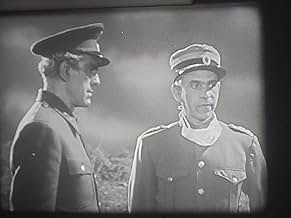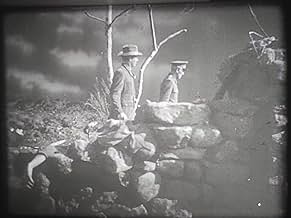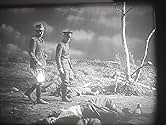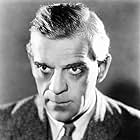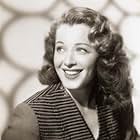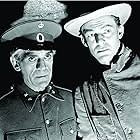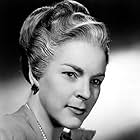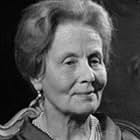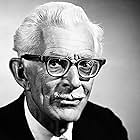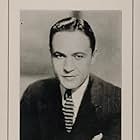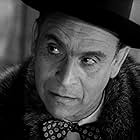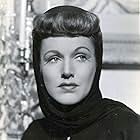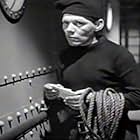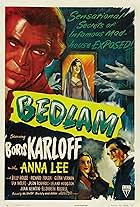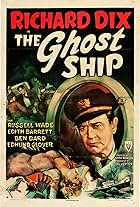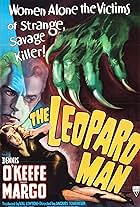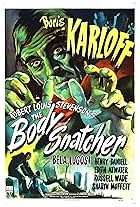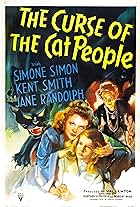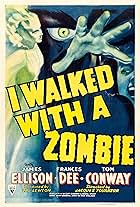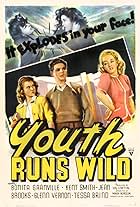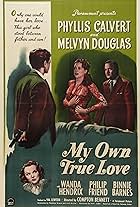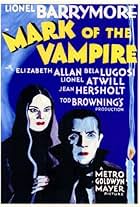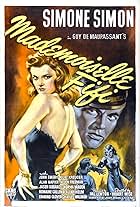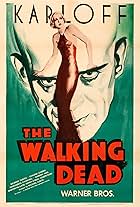IMDb RATING
6.5/10
5.4K
YOUR RATING
A Greek general takes leave from the 1912 Balkan War to visit a small island in Greece, where his wife is buried. A plague soon breaks out and he is forced to stay when quarantine is declare... Read allA Greek general takes leave from the 1912 Balkan War to visit a small island in Greece, where his wife is buried. A plague soon breaks out and he is forced to stay when quarantine is declared.A Greek general takes leave from the 1912 Balkan War to visit a small island in Greece, where his wife is buried. A plague soon breaks out and he is forced to stay when quarantine is declared.
- Awards
- 2 nominations total
Jason Robards Sr.
- Albrecht
- (as Jason Robards)
Ernst Deutsch
- Dr. Drossos
- (as Ernst Dorian)
Sherry Hall
- Col. Kobestes
- (uncredited)
Erick Hanson
- Officer
- (uncredited)
Rose Hobart
- Mrs. Mary St. Aubyn (in long shot)
- (uncredited)
Skelton Knaggs
- Andrew Robbins
- (uncredited)
- Director
- Writers
- All cast & crew
- Production, box office & more at IMDbPro
Storyline
Did you know
- TriviaRose Hobart was cast in the film, but Boris Karloff became ill and the production had to be shut down until he recovered. By the time he returned, she was already working on another film and was replaced. However, Hobart said in a 1984 interview that she can still recognize herself in long shots.
- GoofsAlbrecht refers to Hermes as the god of medicine. In Greek mythology, Asclepius was the god of medicine. In terms of medical support, Hermes' assistance was sought by runners or any athletes with injuries.
- Crazy creditsIntro: "Under conquest and oppression the people of Greece allowed their legends to degenerate into superstition; the Goddess Aphrodite giving way to the Vorvolaka. This nightmare figure was very much alive in the minds of the peasants when Greece fought the victorious war of 1912."
Featured review
In 1912, a stern old Greek general finds himself trapped on the ISLE OF THE DEAD after an outbreak of the dreaded plague.
When the front office at RKO Pictures informed producer Val Lewton that Boris Karloff had been procured to appear in his next suspense film, he wasn't entirely pleased. Karloff was famous for his portrayal of horrific monsters & mummies, sensationalist creations not at all in tune with the psychological thrillers for which Lewton was noted -- with very low budgets, he was able to fashion fascinating films in which the atmosphere was every bit as important as the plot.
Luckily, Karloff turned out to be an inspired choice. Determined to show that he was a skilled actor (actually, he was a very fine & talented performer) he was completely in sync with what Lewton envisaged, giving a nuanced portrayal of an essentially decent man who finds himself slowly driven to a sort of despair by the forces around him. He becomes the heart of a film which wisely saves its shocks for the last few minutes, having built up to the eerie climax slowly & inexorably.
Lewton was very pleased with Karloff's work and arranged two more collaborations. With only two weeks left in filming ISLE OF THE DEAD, Karloff had to be hospitalized for serious back problems. On his release from hospital, he found Lewton was all prepared to film THE BODY SNATCHER (1945). Karloff gave another wonderful performance, before finally finishing ISLE OF THE DEAD. The following year Karloff starred in Lewton's BEDLAM (1946), completing the trio of very tidy thrillers.
Karloff's co-stars give him good support, especially Ernst Deutsch as a military doctor; Alan Napier & Katherine Emery as a British consul and his invalid wife; Helen Thimig as a superstitious Greek peasant; and little Skelton Knaggs, who in a tiny scene with only a few words is able to make his Cockney tinker character come alive.
Ellen Drew & Marc Cramer handle the romance, which fortunately does not intrude too much on the story.
The viewer, in the course of watching ISLE OF THE DEAD, will discover much about the medical state of catatonia, as well as the monstrous vorvolaka, part vampire - part werewolf, which haunts Greek nightmares.
Lewton based his ideas for this film on a painting he had seen as a boy in Russia, Arnold Böcklin's darkly allegorical Island of the Dead (1880), which is shown behind the opening credits of the film. This somewhat sinister painting was also the inspiration for Sergey Rachmaninoff's celebrated symphonic poem, The Isle of the Dead' (1909).
Incidentally, the conflict which is the background to the film was the Balkan War of 1912, in which the Balkan League (Greece, Serbia, Bulgaria & Montenegro) attacked the Ottoman Empire and destroyed most of its hegemony on the European continent. Begun in October and ended in December, it was short & bloody. However, troubles in Constantinople started hostilities up again in January of 1913. It finally ended in May, with the Turks once more decisively defeated. Although the Empire was left very much weakened, the War solved very little else. In June, the victorious parties began fighting amongst themselves, with Greece & Serbia trouncing Bulgaria by August. Greece ended the two short Wars with Crete and parts of Macedonia & Epirus added to her territories and the new state of Albania was carved out of old Ottoman lands. But ancient animosities were aroused and the entire Peninsula lay waiting for the next international incident, which obligingly took place 10 months later at the Bosnian capital of Sarajevo.
When the front office at RKO Pictures informed producer Val Lewton that Boris Karloff had been procured to appear in his next suspense film, he wasn't entirely pleased. Karloff was famous for his portrayal of horrific monsters & mummies, sensationalist creations not at all in tune with the psychological thrillers for which Lewton was noted -- with very low budgets, he was able to fashion fascinating films in which the atmosphere was every bit as important as the plot.
Luckily, Karloff turned out to be an inspired choice. Determined to show that he was a skilled actor (actually, he was a very fine & talented performer) he was completely in sync with what Lewton envisaged, giving a nuanced portrayal of an essentially decent man who finds himself slowly driven to a sort of despair by the forces around him. He becomes the heart of a film which wisely saves its shocks for the last few minutes, having built up to the eerie climax slowly & inexorably.
Lewton was very pleased with Karloff's work and arranged two more collaborations. With only two weeks left in filming ISLE OF THE DEAD, Karloff had to be hospitalized for serious back problems. On his release from hospital, he found Lewton was all prepared to film THE BODY SNATCHER (1945). Karloff gave another wonderful performance, before finally finishing ISLE OF THE DEAD. The following year Karloff starred in Lewton's BEDLAM (1946), completing the trio of very tidy thrillers.
Karloff's co-stars give him good support, especially Ernst Deutsch as a military doctor; Alan Napier & Katherine Emery as a British consul and his invalid wife; Helen Thimig as a superstitious Greek peasant; and little Skelton Knaggs, who in a tiny scene with only a few words is able to make his Cockney tinker character come alive.
Ellen Drew & Marc Cramer handle the romance, which fortunately does not intrude too much on the story.
The viewer, in the course of watching ISLE OF THE DEAD, will discover much about the medical state of catatonia, as well as the monstrous vorvolaka, part vampire - part werewolf, which haunts Greek nightmares.
Lewton based his ideas for this film on a painting he had seen as a boy in Russia, Arnold Böcklin's darkly allegorical Island of the Dead (1880), which is shown behind the opening credits of the film. This somewhat sinister painting was also the inspiration for Sergey Rachmaninoff's celebrated symphonic poem, The Isle of the Dead' (1909).
Incidentally, the conflict which is the background to the film was the Balkan War of 1912, in which the Balkan League (Greece, Serbia, Bulgaria & Montenegro) attacked the Ottoman Empire and destroyed most of its hegemony on the European continent. Begun in October and ended in December, it was short & bloody. However, troubles in Constantinople started hostilities up again in January of 1913. It finally ended in May, with the Turks once more decisively defeated. Although the Empire was left very much weakened, the War solved very little else. In June, the victorious parties began fighting amongst themselves, with Greece & Serbia trouncing Bulgaria by August. Greece ended the two short Wars with Crete and parts of Macedonia & Epirus added to her territories and the new state of Albania was carved out of old Ottoman lands. But ancient animosities were aroused and the entire Peninsula lay waiting for the next international incident, which obligingly took place 10 months later at the Bosnian capital of Sarajevo.
- Ron Oliver
- Oct 30, 2001
- Permalink
Details
Box office
- Budget
- $246,000 (estimated)
- Runtime1 hour 11 minutes
- Color
- Aspect ratio
- 1.37 : 1
Contribute to this page
Suggest an edit or add missing content

